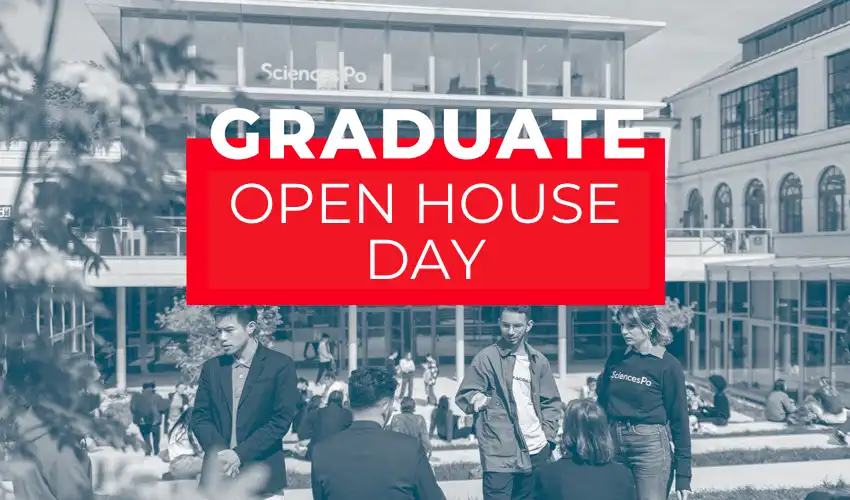Home>"It’s about being able to figure out solutions and get the work done anyway"
30.05.2023
"It’s about being able to figure out solutions and get the work done anyway"

Interview with Élise Blanchard, graduate of the Columbia / Sciences Po double degree in journalism.
May you describe your academic and professional background?
I studied US Literature and Creative Writing, thinking writing would be what I’d end up doing. After a short stint working in publishing in NYC — and realizing it wasn’t for me—I joined Sciences Po Journalism School with no journalism background.
Before the end of the Dual Degree, I knew I wanted to work in Afghanistan. So I prepared myself for that. I did my homework so I wouldn’t get there not knowing anyone or with no knowledge of the country, or without preparation regarding security. After graduating, I took a 6-month internship at VICE News in Paris, then took a lot of different jobs—even bartending—to save money before I left for Kabul. I wasn’t sure how long I’d stay, now it’s been over 4 years. I started as a freelancer, my first year, learning the ropes. I had also kept a remote editing job to be able to make ends meet before I could do that only with work on the ground.
Then I joined the AFP Kabul bureau. After two years there, when it was time to move to another bureau, I decided to leave the agency and stay in Afghanistan as a freelancer. Since then, I’ve been doing mainly photo and text – my own pieces, ranging from magazine stories to fast-paced reporting, but also, and that’s most of what I’ve been doing recently, taking photo assignments for media, working alongside their correspondents. I also do video from time to time, and often work for NGOs—they send me around the country to shoot photos/videos of their activities.
What is your job title today? How is your daily routine?
I don’t really have a job title, but if I have to pick one based on what I do most, I’d say freelance photographer and journalist based in Afghanistan. I don’t really have a routine, it really depends on what I’m working on. Around half the time I’ll be travelling around the country for work, so I have to adapt to the setting. When I’m home in Kabul, I’m usually either out working on assignments or sitting at home editing/writing— or recuperating. When I can, I have meetings, I research new ideas, see friends…
What were the main takeaways from your degree?
At Columbia, I took some classes that turned out extremely useful, especially "Conflict Reporting". It was great being able to sit for specific classes that made sense for what you wanted to do. I was very inspired by some of my professors, people I admired. Getting to see their vision, the way they worked, was great.
At both schools, it was useful to get a sense of the different kinds of ways one can do journalism, what’s out there, the different mediums, since I really didn’t know much. Although I wasn’t always crazy about it at the time, it turned out useful to learn a bit of everything. For instance, when I started to do video again this year, even if it’d been years I hadn’t done it, the classes I’d taken in school helped me get back into it. And I think it was really worth trying out different things. Photo for instance, I just took a class my last semester, it wasn’t technical and I worried I’d started too late. But it made me see how much I loved it, and gave me the motivation to keep learning on my own.
What memories did you keep from your school, your cohort, your teachers?
I have really strong memories from some teachers. It is such a privilege getting to learn from a professional you admire, who is excited to teach his craft, and, since we were most of the time in small groups, there's really space to get their specific ways of working, their vision. And all the assignments pushed me to do fascinating reporting - I did most of my assignments about migrants in Paris, reporting around camps. Then at Columbia, I did follow Afghan women refugees, I saw them vote for the first time, followed them when they went to demonstrate in DC... It was great to work for real and not just in school.
What advice could you give to a student who would like to become a journalist?
One thing I wish I’d known earlier is hat there isn’t just one, or two, or even twenty right 'paths' to get to on the field. So there's no need to compare yourself to others who might have more experience, or to worry that you didn’t get that award or bourse, or the best internship. I think, if you find something you love doing, there are fair chances you’ll be able to hang in there and stay motivated even when it gets really tough—in my case it often was, and still is--or feel like it’s not going to work out. That also applies to your work on the field. There’s usually something that doesn’t go as planned and it’s about being able to figure out solutions and get the work done anyway.
Also, it’s really important to treat one’s peers well. In Kabul, the journalist community already there was incredibly kind, generous with their time, and patient with me. They helped me out and gave me advice from the minute I got there. I’m sure I would not have survived a month without that support network. So I’d say don’t hesitate to reach out to people for help, but don’t take it for granted, people don’t owe you.
Virtual Graduate Open House day, October 2025

On 18 October 2025: meet faculty members, students and representatives and learn more about our 30 Master's programmes.